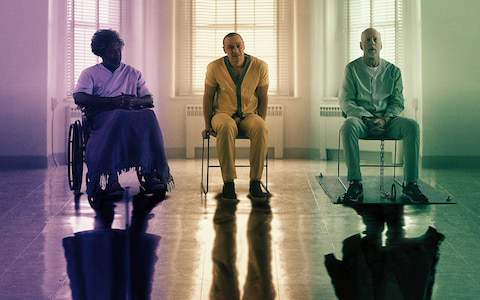By Susan JAMES
For those of you out there who are enthusiastic followers of the work of auteur writer-director M. Night Shyamalan, “Glass” is the third in his myth-making Eastrail 177 trilogy, a spin on superheroes, comic book connections and the othering of people with special gifts. For those of you for whom Shyamalan’s best work was 1999’s “The Sixth Sense,” “Glass” will be a trippy journey through the looking glass of “what did that scene just mean?”
In 2000 Shyamalan produced the film “Unbreakable” with Bruce Willis playing a character named David Dunn, who (tell me if you’ve heard this before) achieves superpowers through a horrific accident, this time on a train. While trying to understand the massive changes to his life he enters the orbit of sinister, disabled comic book addict Elijah Price (Samuel L Jackson). Sixteen years later, Shyamalan released “Split” in which he cast James McAvoy as a cannibalistic serial killer sporting multiple personalities. His alter ego, the Beast, seems to be Shyamalan’s version of the Incredible Hulk. “Split” was loosely linked to “Unbreakable” by a tiny Willis cameo at the end of the movie.
Fast-forward three years to “Glass.” If you haven’t been paying attention, or if 19 years is a long time to remember storyline details, re-watch the first two movies or you’ll spend the entire very long film trying to figure out scenes that reference ones that seem to have been cut but actually occurred in the earlier movies.
It’s present day and all of the superheroes – Willis’ David Dunn, Samuel L. Jackson’s Elijah Price and James McAvoy’s Kevin Crumb – are wandering the city of Philadelphia. Price is snapped up by a shady psychiatrist named Dr. Ellie Staple (Sarah Paulson) and clapped into a psychiatric facility where he pretends to be mentally unresponsive. Dunn is looped in his own vigilante campaign to rid the city of violent criminals when he happens to pass Kevin on the street and mind reads where Kevin and his Hoard (group speak for all of his alternate personalities) are keeping a string of cheerleaders chained up. During the rescue of the “help me, help me” girls, Dunn goes mano a mano with Kevin and both are captured by the police and clapped into Dr. Ellie’s psychiatric facility. The good doctor has three days to convince these self-identified superheroes that there is no such thing as a superhero and they’ve all been reading too many comic books. Things deteriorate from there.
As a dramatic conclusion to two decades of filmmaking, “Glass” doesn’t make the cut. The acting is perfunctory unless you think McAvoy’s constant morphing from character to character is Oscar-worthy. He does a lot of chomping and heaving and muscle-flexing but even for McAvoy fans it’s a bit over the top. Willis walks through the scenes like he’s not sure what movie he’s actually in. Jackson manages to look both pathetic and sinister, which I guess is an achievement in itself.
But don’t get me started on Paulson’s Dr. Ellie. To say the part lacks conviction is to say the sun rises in the east. In all the scrum of stiletto-heeled, skirt-cinching, vapidly vacuous female doctors that Hollywood has inflicted on movie audiences, this performance is right up there.
But don’t take it from me. If you’re a “Glass” half-full kind of movie fan, take a sip yourself.
See you at the movies!

